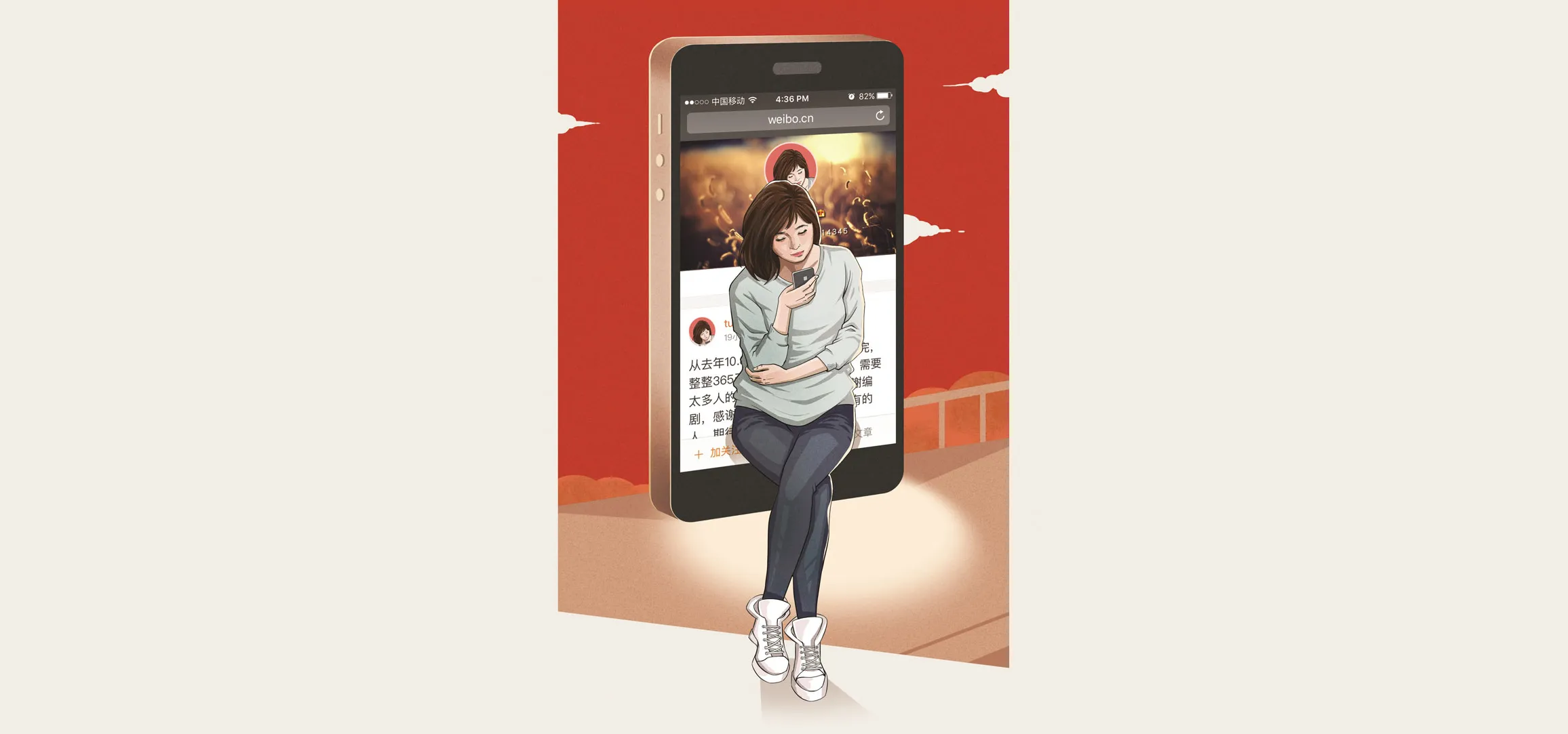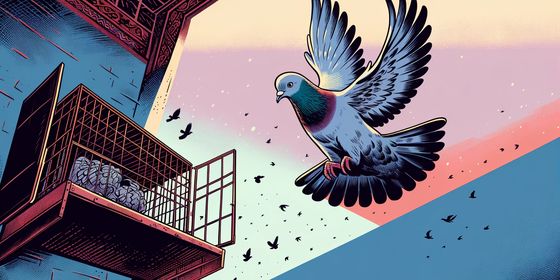A young woman with romantic aspirations finds solace in Weibo, where she makes a tragic realization about herself
1
Going to work on the subway, she would habitually pull out her phone to go on Weibo.
Today was the birthday of some great personage. Some government account had microblogged their congratulations.
She forwarded the post, becoming a link in a chain of “May the world be as you wish.” Suddenly, her usually lonely home page was filled with 20 or 30 more forwards.
She didn’t know where the feeling had come from, but at this moment, she was moved by the grave torments of history, the solemnity of the august personage, and the ovation of the crowds.
Her thoughts wandered to many places.
Poems, images of people, scenes on TV of oil rigs amid azure skies and blue seas flashed across history before her eyes. It was a collection of all her positive impressions of this country. She thought, giddy and confused: I’m part of something deeper, greater.
And the crowded and enclosed carriage, the forms of the passengers sleepily hanging onto the ceiling straps, the stench of sweat and cheap food in the confined space were no longer so hard to bear.
Her blood was burning.
She thought, she would do something for this country, anything!
She had to work hard, to do absolutely all she could.
This morning’s task was to deliver the application for a project to some city department.
First, however, the leader had to come for an inspection, so she had no choice but to go with her supervisor to receive him.
Her job was to take pictures: Pictures of the leader performing the inspection, pictures of the leader holding a meeting; and also to serve tea and pour water.
The job was familiar and boring; her legs hurt, as she had to wear high heels.
After the leader left, she had to write a press release of his inspection for their official website.
As to what the leader had actually said, she hadn’t listened carefully. All leaders were good at speaking, and mostly said the same things. She could just copy the contents of a previous release, paste it in the new one, and nobody would know.
Finally, she finished writing, grabbed a bite, and went to deliver the materials.
She arrived at 1:30. The office reopened at 2 p.m., so the door was closed. She had to wait with the others at the entrance to the stairs, drenched in sweat.
At exactly 2, the door opened, and cool air rushed out. The clerks sat behind a window, faces blank.
The crowd swarmed like bees, and the office worker gestured for them to take a number.
The ticket machine instantly drew a crowd.
After great effort, she got a ticket, stood in line, found out a certain spot wasn’t properly stamped, and went to two other places that afternoon to get it done.
In the end, they said there was another form that needed approval from a different government office, so nothing could go forward.
She blew up. “You couldn’t have told me earlier?”
The clerk sat behind the window, staring at the computer, expression blank.
She was an easygoing girl, quick to anger and quick to calm down. She looked around, afraid she’d caused trouble.
When she saw nobody looking at her, she sighed with relief, and thought numbly how she’d been at this for months—what was another setback?
2
She tiredly scrolled through Weibo on the subway home.
The morning’s high spirits were long forgotten.
On the front page, there were cute emojis of cats, dogs, and a little seal that looked like a rice ball. She felt better.
Then there were the trending topics: Who’d had an affair, who got caught soliciting prostitutes. In a few stops’ time she went from “who is this?” to knowing their rank and serial number.
Before getting off, she hit “like” on a long post criticizing chauvinists.
She was an only daughter from a big city, having grown up doing all the right things. If she didn’t go on Weibo, she wouldn’t know about how all women were being oppressed.
Online, there were people mansplaining to her. There were child brides being trafficked in mountain villages near and far. Even in a city nearby, she heard that there were weirdos who got married only after having a son. It taught her to open her eyes, stay on her guard.
Forwarded: “Stay fearful of marriage. Be financially independent, don’t marry, and stay safe.”
Her usually lonely home page was filled with 20 or 30 more forwards.
She returned to her 60-square-meter home.
Her mother was bustling in the kitchen, father slouched on the sofa with shoes off. His feet stank.
She went into her room and closed the door, pretending to be busy. She was back on Weibo.
Outside, a voice called her to eat.
Her father said the food was too salty. Her mother threw the chopsticks down.
They argued. Like every day.
After arguing, they turned to her marital situation.
“You’re 26, you’ve not had a boyfriend, your father and I are worried. We go all around trying to find you a match.” One was coming tonight, she had to get ready.
Soon, a man showed up with his son and two cartons of cigarettes.
The son was 30, but looked 40, taciturn, and sat on the sofa without a word.
He worked at a hardware factory and made 5,000 yuan a month. His parents had a stall in a vegetable market.
She kept her head down and browsed Weibo.
After he left, her father was still drinking. The mother and daughter washed up in the kitchen.
Mother: So?
“…”
Mother: You’re 26. If you don’t get married, nobody will want you.
“Who’d marry him?”
Mother: You’re not a beauty queen, what do you want? As long as it’s a good guy, that’s enough.
“Not with a job like that.”
Mother: Just because you work at a state-owned enterprise, doesn’t mean you have a career. You make 3K a month. Your position just sounds nice.
She mumbled. I don’t want to get married.
Mother: Don’t be ridiculous! How will you have children? Are you going to live with us for the rest of your life?
“The new marriage law is a scam. It’s not a good choice economically for women to marry.”
Mother: How’s it a scam?
She stammered, unable to retort.
She had seen many long posts on Weibo about the marriage laws. She read them every time, only to find halfway through that they were dry, so all she was able to come up with were buzz phrases like “prenuptial assets” and “division of assets.”
Mother: You’re not even married and you’re talking about divorce, really? Husband and wife are companions for life! Your father and I have argued for 30 years and we managed.
Finally, they were done. She put on some inexpensive lace pajamas, turned on the air conditioner, and lay on the bed. Her sheets were printed with cartoons, the wall behind her was covered in anime posters.
Her mother was still outside doing laundry. Her father was drunk. The two of them argued over whether to buy her a new laptop, complicating her feelings further.
She was an only daughter from a big city. Although she’d been brought up modestly, she thought she was quite precious.
Not just precious, but interesting, special, fashionable. On her bookshelf there were some anime figurines she’d saved up to buy.
Although she was older, her hobbies were the same as when she was in middle school. That year, anime had become popular, and she embraced it so as to not be left out. Even now, she called herself a“2-D1” so that she could stand out among the masses.
She couldn’t marry a laborer, a mindless zombie, a reject of the times.
Even more so, she couldn’t be like her mother, a lifetime of working hard at her job, working hard at home, arguing every day. What was the upside to that?
She looked at the clock. It was 9. With nothing to do, she browsed Weibo.
It was the birthday of an anime character she used to love.
Time to forward: “Ahhhhhhhhhhhhhhh, my husband! I’ll always be there for you!”
3
She had no talent. She couldn’t draw, couldn’t edit video, hated writing, and was worse at social interaction.
She could only be on the periphery of various 2-D groups.
Sometimes she’d look at the homepage and wonder: These girls who were mostly the same age as her, how could they be so accomplished?
Before, she liked to guess their ages, chuckling, “She’s a year older than me,” or “Wow, she’s three years older,” but as she grew older, and they grew younger, she gave up secretly comparing herself with others.
She could age a year, three years, even 10 years, and never be at their level.
She’d grown used to it. She was never an exception as a child. She could go online, but not go big—she was destined to be a fan.
There was a blogger she especially liked. She left comments on her Weibo, joined her readers’ group, lurked there every day, listening to the netizens around the country babble about their online purchases that’d arrived, their stupid friends, their crushes.
One day, the blogger published a Weibo post.
It was dissing someone, she didn’t know who; a cosplayer from another group.
But the long essay enumerated this person’s crimes.
This person was nuts, disrespectful; she uses old photos to pretend she was currently traveling, had no right to be in their company.
Just reading it made her furious.
The blogger said: “She’s the worst!”
She parroted: “She’s the worst!”
Flocking to the accused’s Weibo, she commented: How can someone like you even exist? You’re so arrogant! You’ll never go anywhere!
It became the second-most “liked” comment.”
The most “liked” comment was a long string of obscenities. She conceded to the writer’s superior skill, and threw them a “like.”
The accused shortly afterward apologized, and exited Weibo, never to update again.
She was full of hot air.
If she didn’t encourage the good and punish the wicked, who would?”
All kinds of smack was talked in the group that night.
She followed the drama all night, loving it.
Even when the blogger jumped into the conversation, it was to continue the conversation she had started.
Someone took a screenshot of her trending comment: “Is that you? Your profile picture looks familiar.”
Everyone was suddenly recognizing her. She was overwhelmed by the attention.
By criticizing and swearing at someone else, she had grown closer to the blogger, as if they formed a deeper bond. The people in the group ceased their prattling about their online purchases, stupid friends, and crushes, and became a unified front.
She thought, giddy and confused: “I’m one with these people.”
They were inseparable, unified in mind.
Not like those other degenerates.
The next day, on the subway, she was still in very high spirits.
She was communicating with her online friends; she was on fire. The phoenix had risen. People were saying “good morning” in the group and she joined in.
All of a sudden, she felt she’d been groped.
She jumped, and pushed into the center of the crowd, but the hand seemed to follow.
At the next station, she squeezed out of the car, preferring to be late than stay on. It took a long time for her feelings of disgust to fade.
Time to post a Weibo.
Some of her friends sent her emojis of hugs, and said comforting things.
A more aggressive girl said: “Call the police! Don’t let him get away!”
She hadn’t thought to do so until then.
While she was thinking, her post was forwarded more than a hundred times. Users in the same city asked which line she was on, what the perpetrator looked like.
She hadn’t even dared to turn around when it happened, much less taken a picture.
She thought of a gif she’d seen online, where a girl who’d been pawed at smashed a groper with her bag. Suddenly, she felt ashamed. She thought she was a weak girl. What could she have done? It was enough that she got away. She calmed down a bit.
Only the post wasn’t so good anymore. Why share such a thing with everyone?
Deleted.
4
Her grandmother was sick.
Her family was thrown into disarray. She also went back to see her grandmother.
Her grandmother was staying in the hospital, cared for by her mother and aunt in shifts; her only job was emotional support.
At the start, she showed her grandmother funny gifs on Weibo. Her grandmother had cataracts and couldn’t see clearly, but laughed with her. She thought that wasn’t a great solution, so she turned on the radio, and told her to listen to the news.
Soon, her uncle’s family came with her nephew. He was young and very cute. Everyone played with him for a long time. She held him and took a picture, using a trendy filter to turn them into a cat and dog, shaking their claws at the lens. She showed it to her grandmother, and posted it on Weibo.
This post got many comments, 50 or 60. She read all of them from top to bottom, then bottom to top. She couldn’t take her eyes off them.
Her mother saw she wasn’t helping and told her to go home, as she had to work the next day.
As she left the room, her grandmother spoke feebly from the bed: “Goodbye.”
One day when she was peeking at Weibo at work, her phone vibrated.
“Take time off and come back. Your grandmother isn’t going to make it.”
She was shocked, and cried.
Her grandmother had raised her as a child, and they had been close.
Rushing back to her hometown, she saw her grandmother for the last time, and cried like her heart was breaking.
At night, when they were holding vigil, she spent a long time typing out an essay, reflecting upon the fun she’d had at her grandmother’s house, how her grandmother’s thin white hair fluttered in the wind as she sent her off at the train station to school, how after she’d grown older, she’d rarely called.
A reply came in: “I have a good relationship with my grandmother, too. We also live in different cities, and it’s a six or seven-hour train ride to go see her, so I only see her two or three times a year. Life is short, and your family won’t always be there, so I’m going to see her this weekend.”
She replied: “Right, right.” Her thoughts drifted elsewhere.
On the high-speed train, it was only a 20-minute ride to her grandmother’s. “But I’m busy this weekend…” she’d think.
Her aunt said to her mother: “It’s late, have Jiejie go back and sleep.”
“Her? She’s a night owl!” said her mother. “Whenever she’s on vacation, she wakes up at noon, and isn’t satisfied unless she’s on her phone until daybreak!”
The day her grandmother was cremated, she headed back to work. The grown-ups talked as they waited for their ride, while she sat upon the rusted swing in front of her grandmother’s house.
The sun was shining brightly, and the world in front of her had never seemed so colorful.
She thought about how she’d play here as a child, and how all her playmates from that time had gone their separate ways.
She thought being an adult would be marvelous, that there’d be so many possible futures to choose from.
Yet there weren’t.
None.
So she chose not to choose.
She didn’t know what she could do, nor did she know what she was looking for. She seemed to exist between the virtual and the real. She was too brilliant, too special for this dreary reality yet in the virtual space, she was too boring. It seemed as if she understood the world, yet didn’t understand anything.
Silence; a long silence.
An idea suddenly appeared in her mind. “This world is racing forward, and it’s as if I’ve been left behind.”
She was gripped by a great, vague feeling of fear; she almost couldn’t breathe. Subconsciously, she whipped out her phone, and opened Weibo.
On the front page, there were cute emotion stickers of cats, dogs, and a little seal that looked like a rice ball. There were voices of strong women, and thousands of witty punch lines. So many people punishing the wicked, encouraging the good, upholding justice; solemn official accounts singing the praises of the country, its power and prosperity…
The fear disappeared from her face, her brows relaxed; she looked intoxicated.
“How wonderful…” she thought.
“Our ride’s here! Let’s go!” said her mother.
She replied: “Hold on! Let me read one more!”
The Girl Who Lives on Weibo is a story from our issue, “Cloud Country.” To read the entire issue, become a subscriber and receive the full magazine.













